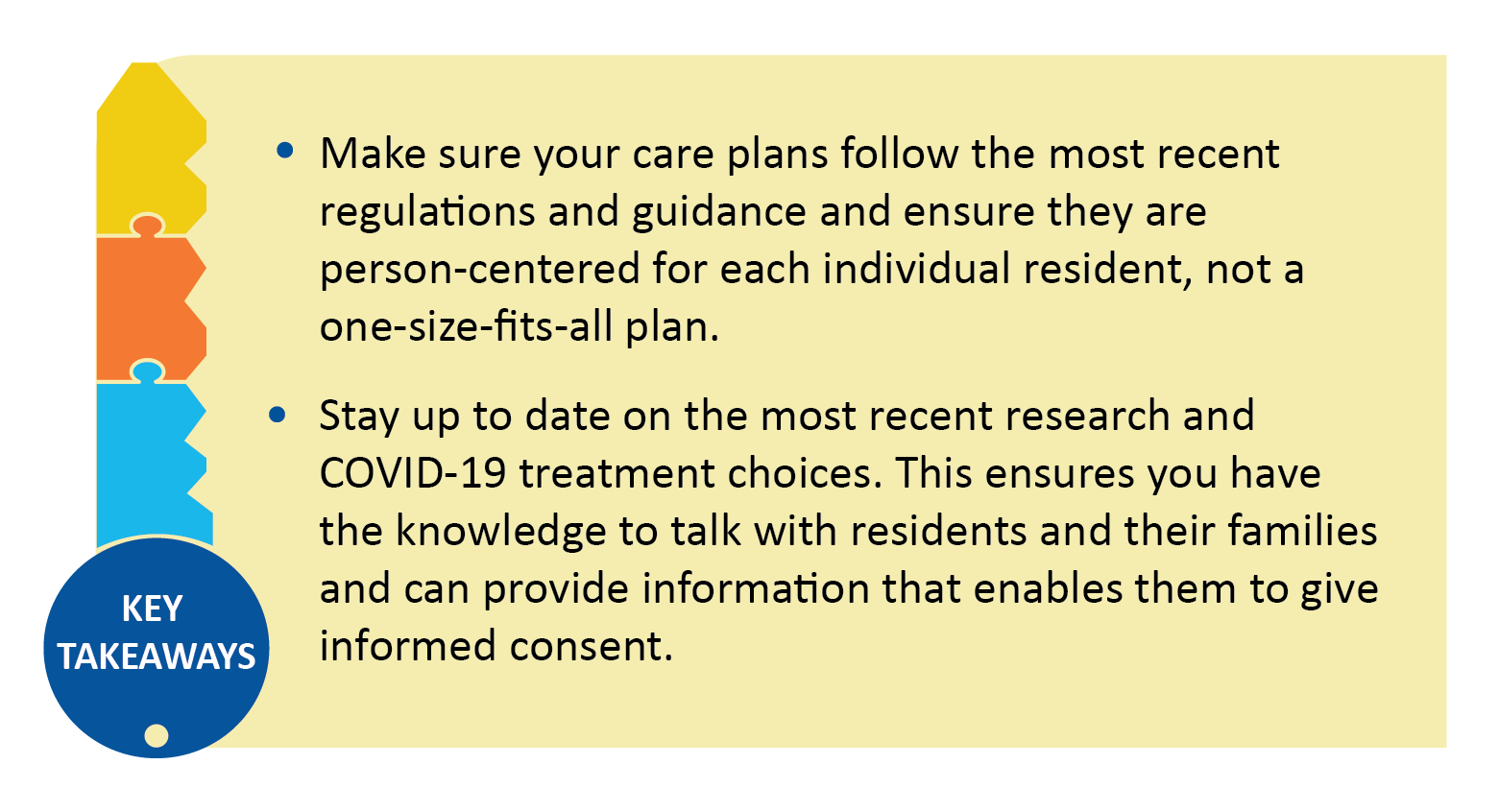Nursing home residents are nearly all at risk for severe COVID-19 outcomes, including hospitalization and death. Vaccination offers the best protection against severe outcomes and can prevent the spread of infection. However, developing treatment plans for each resident in case of infection and administering COVID-19 therapeutics at the onset of symptoms are additional strategies that support better resident outcomes.
A nursing home in rural Oregon is using these strategies to reduce the risk of severe COVID-19 outcomes among its residents. The facility, which was at the epicenter of the COVID-19 pandemic in early 2020, follows a small home model featuring four different neighborhood buildings. Each neighborhood has three “houses” with private rooms centered around a kitchen. This model was beneficial to the facility in the early days of the pandemic because, unlike typical facilities that have long hallways with many rooms, the houses are U-shaped with double doors that lead to a set of 14 private rooms. The doors can be closed, limiting exposure.
Ensuring Residents are Up to Date with COVID-19 Vaccinations
Nursing home staff members perform vaccination clinics weekly, despite the 90-mile distance between the nursing home and the nearest pharmacy. Staff members order the vaccine at least 48 hours in advance, and it arrives with the nightly medication drop. The vaccination clinics offer both the monovalent primary series and bivalent COVID-19 booster vaccine. This has allowed the facility to maintain a 77 percent resident COVID-19 bivalent booster rate as of the last report to the Centers for Disease Control and Prevention’s (CDC) National Healthcare Safety Network in January 2023.
Incorporating Treatment Plans into Isolation Care Plans
While the facility has a high vaccination rate and a unique design that limits the number of residents who are exposed to COVID-19, there is still a risk of infection. To support better outcomes among residents who contract COVID-19, the facility embeds treatment plans for each resident within their isolation care plans. Barriers to participation outside of social isolation – such as those with hearing issues who may have difficulty communicating with masked staff members, as well as those with vision difficulties or in cognitive decline – are identified and used as the basis for a resident’s care plan. Most of the facility’s residents have experienced trauma, which staff also consider during isolation.
Prescribing and Educating Residents About COVID-19 Treatments
When a resident has a suspected COVID-19 infection, the nursing home’s physicians review the resident’s care plan to ensure it is consistent with the most up-to-date guidance on therapeutics for COVID-19. Treatment options that are best for the resident are shared with frontline staff who talk with the resident and their family about the benefits and risks and why a particular treatment is being prescribed.
Key Takeaways
 The facility functions as a well-oiled machine to meet the unique needs of its residents. Teamwork and effective communication among its more than 200 staff are key. For nursing homes looking for advice on developing care plans or incorporating the use of therapeutics for residents diagnosed with COVID-19, the facility recommends:
The facility functions as a well-oiled machine to meet the unique needs of its residents. Teamwork and effective communication among its more than 200 staff are key. For nursing homes looking for advice on developing care plans or incorporating the use of therapeutics for residents diagnosed with COVID-19, the facility recommends:
- Making sure your care plans follow the most recent regulations and guidance and ensure they are person-centered for each individual resident, not a one-size-fits-all plan.
- Staying up to date on the most recent research and COVID-19 treatment choices, so you have the knowledge to talk with residents and their families and can provide information that enables them to give informed consent.
Available Resources for Nursing Homes
Nursing home leaders can get the facts about COVID-19 vaccines, treatments and successful practices to improve resident outcomes by listening to the Centers for Medicare & Medicaid Services (CMS) audio series, CMS QI Voices: Improving COVID-19 Outcomes in Nursing Homes Across America. In a special series of three 15-minute episodes, CMS Chief Medical Officer Dr. Lee Fleisher leads clinical discussions with experts from the Centers of Disease Control and Prevention and the U.S. Food and Drug Administration Center for Biologics and Research, including the benefits, risks and side effects of therapeutics for nursing home residents diagnosed with COVID-19.
Comagine Health, a CMS Quality Innovation Network-Quality Improvement Organization, recently held a roundtable on Utilizing COVID-19 Therapeutics in Long-Term Care Settings. The discussion featured subject matter experts highlighting the benefits and challenges of using COVID-19 therapeutics to reduce mortality in long-term care. A video of the event, summary of key learnings and presentation slides are available to view.
This material was prepared by The Bizzell Group (Bizzell), the Data Validation and Administrative (DVA) contractor, under contract with the Centers for Medicare & Medicaid Services (CMS), an agency of the U.S. Department of Health and Human Services (HHS). Views expressed in this material do not necessarily reflect the official views or policy of CMS or HHS, and any reference to a specific product or entity herein does not constitute endorsement of that product or entity by CMS or HHS. 12SOW/Bizzell/DVA-1140-07/18/2023

